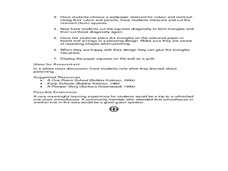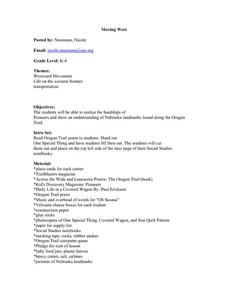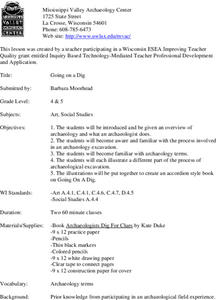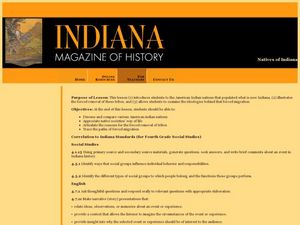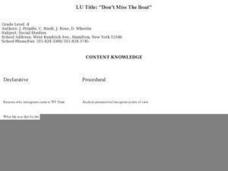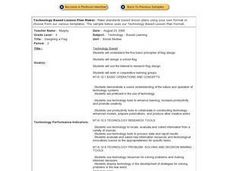Curated OER
Child Labor during the Industrial Revolution and Now
Fifth graders research topic of child labor by studying Industrial Revolution, read about child labor laws, and examine countries where child labor still exists today. They then choose single question to research from list, and create...
Curated OER
History of the American West
Ninth graders research early mining in California. They study the "placer method" for mining gold, which is surface mining that does not involve tunneling. They examine what it was like for the early miners to pan for gold with...
Curated OER
Schoolhouses
Fifth graders research life in a one- room schoolhouse. They plan and carry out a mock day in a one-room schoolhouse. They make slates on a prior day by painting small boards with chalkboard paint.
Curated OER
Moving West!
Students explore, explain and experience the importance of good character traits in everyday life by assessing the challenging journeys traveled on the Oregon Trail. They study the daily accounts of perseverance and courage along the trail.
Curated OER
Preserve is the Word
Young scholars investigate a list of archaeological ethical questions. They select a question/issue and design a 3-minute (maximum) PSA to persuade the public to agree with their idea. They conduct research or interviews with experts to...
Curated OER
Going on a Dig
Learners study an overview of archaeology and what an archaeologist does. They examine the process involved in an archaeology excavation and illustrate a different part of the process of archaeological excavation.
Curated OER
Natives of Indiana
Fourth graders participate in discussions about the Native Peoples who inhabited what is now Indiana. In this Native American lesson, 4th graders discuss the social and cultural structures of these Native Americans. They locate the...
Curated OER
Don't Miss The Boat
Fourth graders study immigration and what it is like to be an immigrant. They choose immigrant identities, dress appropriately, and role play during an International Fair where each student displays some aspect of his/her "home country."
Curated OER
The Constitution.
Second graders study the Constitution. They examine the meaning and fundamentals of the Preamble of The Constitution of USA. They assess the importance of having a Supreme Law that states the rights and obligations of the citizens. They...
Curated OER
Nature Print Silk Suncatchers
Students are introduced to the beauty of silk painting. They create a colorful leaf-print sun catcher that glows when placed in a window. Each student experiences the mixing of the colors and tie a link with Asian cultures, science and...
Curated OER
Social Studies: Global Women and Poverty
Students conduct research and make comparisons about various global economies. Create graphic organizers to present their research findings and illustrate solutions to problems. Students discuss and debate issues based on what they have...
Curated OER
Hoosier Soldiers at Vicksburg
Eighth graders examine the role of Indiana soldiers at the Battle of Vicksburg. In this American Civil War lesson, 8th graders listen to a lecture about the involvement of Indiana soldiers in the battle and then analyze letters written...
Curated OER
The Beat of Mexico
Students explore mariachi music and create their own rhythm instruments. They study the music of Mexico. They listen to a variety of music, then vote for the song they liked the best.
Curated OER
Small Steps; Great Journeys
Twelfth graders examine contributions to communities. In this philanthropy lesson, 12th graders discuss the quote, "That's one small step for man, one giant leap for mankind." Students identify issues that exist in their community and...
Curated OER
You're Invited to a Ceili: Exploring Irish Dance
Students recognize a Ceili as an Irish dance of celebration and investigate Ireland while studying the dance. In this Irish dance activity, students search the geography of Ireland, read poetry, identify costumes, draw and perform...
Curated OER
Projects For USA Units
Students study different regions of the United states through interdisciplinary activities. This lesson presents very creative, artistic ways for students to explore the variety of regions found in the United States.
Curated OER
Designing a Flag
Fourth graders design a flag. In this social studies lesson, 4th graders discuss the basic principles of flags. Students research flags and flag designs. Students work in teams to design a flag using the computer.
Curated OER
WHO'S IN CHARGE?
Third graders explore the three branches of government, their origins and the purposes of government. Each team develop a PowerPoint presentation of their findings. Stjudents also explore how to be a good citizen.
Curated OER
Travel to Mesoamerica
Students research books, watch movies, and look on the internet to find information on ancient America, Mexico, and Central America. In this Mesoamerica lesson plan, students participate in a social studies unit on North America of the...
Curated OER
Egyptian Dynasties
Sixth graders read the chapters in their social studies books and answer questions about Egyptian Dynasties. In this Egyptian Dynasties lesson plan, 6th graders research in their book, and then work in groups to answer the questions.
Curated OER
Supply and Demand
Students explore social studies. In this economics lesson, students understand the concept of supply and demand and how it affects consumers in every day life. They work as a class to participate in an auction style game.
Curated OER
Holiday Timeline
Students create a timeline to represent state and national holidays. In this social studies lesson, students use colored popsicle sticks along a line drawn on a piece of paper to illustrate when holidays occur.
Curated OER
Reviewing the Rules
Students participate in a group discussion to evaluate rules that the class created together. For this early childhood social studies lesson plan, students condense rules into categories and reword rules to be stated in the positive.
Curated OER
Early Greeks-Unit Test
In this social studies worksheet, 7th graders focus on Early Greeks. Students respond to a total of 30 matching, multiple choice, and fill in the blank questions.


